Episodes: Friday mailbag (August 18) (all Twitter edition)
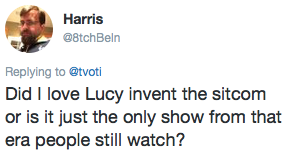
Hey, everybody!
I just realized I haven't done one of these in way too long, thanks to Comic-Con, TCA, and other stuff, so I'm tossing out a mailbag installment -- even as I'm on a plane headed on vacation. Somehow, in my absence, we've gained several subscribers. Welcome to you all and thank you for bringing us several steps closer to an Episodes about the Showtime series Episodes.
Tonight's mailbag is an ALL TWITTER edition, based on whomever was just awake and answered my summons for questions. I'm going to answer as many as I can.

Did I Love Lucy invent the idea of little half-hour stories that invited laughter? Did it invent the idea of having an audience laughing at those things? Did it invent the live studio audience? No! Not at all! Literally all of these things were being done on the radio, where I Love Lucy has its roots.
But Lucy is still essentially the Citizen Kane of TV sitcoms for a simple reason: it invented almost everything we think of as the presentation of them. Working with cinematographer Karl Freund, Desi Arnaz and Lucille Ball invented the multi-camera setup, the idea of certain well-made standing sets where most of the action would take place, and the whole idea of blending the presentation of a stage play with the camerawork of a feature film. Some of these pieces had been invented by others, but Freund, Arnaz, and Ball pulled them all together into one place and created a template that hasn't just been successful in the US but all over the world. Pretty impressive.
And we should probably be thankful Lucy was so influential and such a big hit. If not, we'd probably have to talk about Amos and Andy in the same way, and that show has... some issues... to be kind about it. (I wrote much more about Lucy here.)
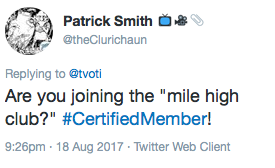
Of all of the sexual fantasies people have, having sex in an airplane bathroom is one that has never held any appeal for me. It's so tiny! (We're really learning a lot together tonight.)

Trust me. When I say it, it's never a weed pun. I'm one lame lame-o.
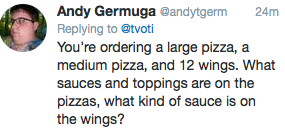
See, I presume that if I'm ordering this much food, I'm having people over, and if I'm having people over, I want them to get something to eat, which probably means a large pepperoni and a medium cheese pizza. There are many reasons for this, but the biggest one is that if you screw up pepperoni or cheese pizza, then you are not going to make other pizzas any better, right? If I'm ordering a pizza for myself from 800 Degrees or something, I almost always get pepperoni, sausage, red onions, and a few jalapenos. But for others, I'll stick with the tried and true. This is also why I'm ordering 12 medium-to-hot buffalo wings. (If it's just me, I'll probably do a split between hot buffalo wings and lemon pepper.)
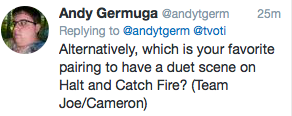
See? Andy gets two questions answered.
Halt and Catch Fire character pairings, ranked
1.) Donna/Cameron
2.) Joe/Cameron
3.) Donna/Gordon
4.) Gordon/Joe (this actually rose a few spots after the first few episodes of season 4)
5.) Cameron/Bos
6.) Gordon/Haley (this is cheating, since it's all based on S4)
7.) Gordon/Cameron
8.) Donna/Joe (feels like they could have done more with this)
9.) Donna/Bos
10.) Joe/James Cromwell
I luv them all tho.

I should state upfront that I'm not a huge Seinfeld fan. I do like the show, and I laugh at it a lot, but I'm not one of those people who can quote episodes chapter and verse. I tend to be more drawn to character-driven comedy than situation- or joke-driven comedy, because I am the worst person alive.
That said, I will probably be boring and go for "The Contest." That is just one of the all-time great comedy scripts. Every punchline is perfectly placed, every moment is genius, and every scene raises the stakes of the story. Larry David is so much better than all of us at writing that it hurts sometimes. Sorry to be boring, but sometimes the consensus choice is right.
I also love "The Pilot" and "The Mango," tho. I'm noticing these all occurred in the same period of time, which plays off one of my favorite TV theories, which is: live-action TV comedies don't have two great seasons but two great calendar years. So for Seinfeld, those would be 1992 (encompassing the back half of S3 and the front half of S4) and 1993 (the back half of S4 and the front half of S5). I don't know why this applies to so many shows I love, but it does. Probably worth looking into.
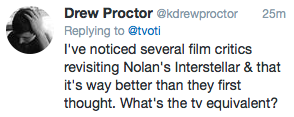
There can't really be one. By its very nature, TV changes so much from episode to episode and season to season that critics can always fall back on, "Well, it wasn't great at the start, but it got so much better later." And, tbh, that's usually true. Most shows get better at being themselves over the course of time, even if what they are is reprehensible to me. You'd almost have to be talking about a one-season show that flopped but was rediscovered, or, I guess, something like the back half of Twin Peaks S2. But the conventional wisdom there -- uneven, with great moments and absolutely awful ones, too -- strikes me as mostly correct.
Another possible answer to this question is a season of TV that is building to something, and knowing the ending makes you re-evaluate everything that came before. But that's tough to do well, and it usually leads to reviews that are along the lines of, "Oh, hey, this didn't really need all that useless stuff at the beginning, but it was going somewhere, so that's nice." As an example, look at the third season of Lost.
Much more common is a show that gets hailed to the rafters in season one, then completely falls apart in season two. But it's rarely that critics and audiences wildly diverge in their opinions there.

Yes? I mean, it keeps getting renewed. And it's still their highest-rated comedy? And still one of the most-watched comedies on TV? Its ratings have sagged a bit in recent years, but the rest of television has sagged, too. It's going to run at least two more years, and I wouldn't be surprised by it stretching to season 13 or 15. At some point, a major cast member will want out, and that will likely prompt its end. But not until then.
(It's also worth pointing out that ABC only collects ad revenue from the show, so I suppose there's a situation where Fox asks for too much in license fee, and ABC cancels it. But it's hard to see that happening sooner than season 11, just based on how TV economics usually work.)
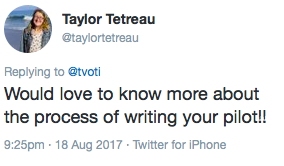
Thank you, Taylor, for asking about my favorite subject: myself. (In case you don't know to what Taylor refers, you can go here.)
Now before I say anything, I want to caution that doing well in this particular contest only means we've done well in this particular contest. For as much as I hope this series becomes a reality, it is right now still just a pretend thing that lives in my head (and takes up a surprising amount of space there). I know much, much less about writing a TV pilot than, well, lots of people. I hope to someday know quite a lot about it, but right now, I know only a bit.
That said, this is not the first pilot I've written. I did this for a long, long time, with some amazing co-writers, and sometimes with just myself, before I felt comfortable really showing people what I'd done. There are a bunch of reasons for this, many of which are tied up in how much I don't want to play into the idea that being a critic or journalist is a second-place job for me to writing for TV. If I'm a critic for the rest of my life, that would be an amazing life, and my criticism and journalism feed very different parts of me.
But you didn't come here to read about my psychological hangups.
Anyway, the idea came to me pretty quickly the second I found the protagonist. And once I had her, I could see the shape of the rest of the show's world and that it was, importantly, a TV show. (A lot of great ideas aren't!) I told Libby about it, and she immediately started bringing her own ideas to the table, and it felt less like creation and more like translation, like some other reality was telling us how things were over there.
But the actual work of it was really painstaking. We went through several drafts, and after each one, we would read it aloud together, switching off parts, looking for weirdness. Then, after we'd revised internally, we'd sent out to new groups of trusted readers to get notes. (This is important: Find people who will tell you if you've done a shitty job. The first draft of this project was OK! But it needed to be more than that, and we found people who were willing to tell us that, yes, it didn't work as written.)
We did an outline for each new draft, too, at least until we knew the structure of it was pretty solid (which didn't happen until around draft 5). These weren't full outlines but, rather, quick little diagrams of where each piece would go, written in a Google doc. We didn't really stand on ceremony. We started the brainstorming process in July 2016, started writing in September 2016, finished draft one later that month, and went through about a draft a month after that.
And after draft 8, we sent it out to NYTVF in April. I hope you get to see it someday. Writing it has been one of the great experiences of my life, and I'm excited to have people know about it, even as a possibility.
That's all the stuff for now! I'll try to dash off a couple newsletters on my vacation, and please remember to send in some questions for future mailbags by hitting reply to this email. (I do see your replies!)
--
Episodes is published three-ish times per week, and more if I feel like it. It is mostly about television, except when it's not. Suggest topics for future installments via email or on Twitter. Read more of my work at Vox




